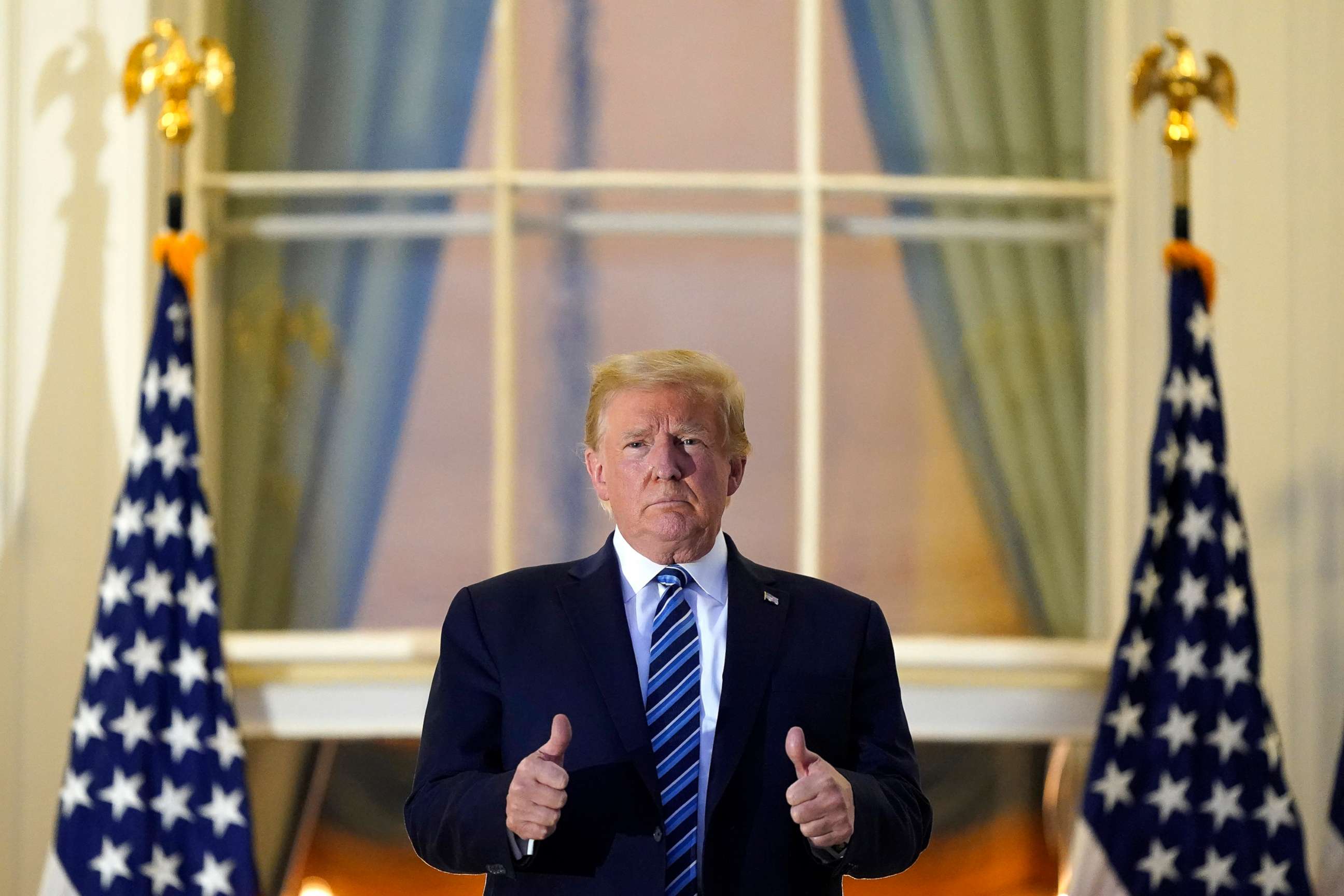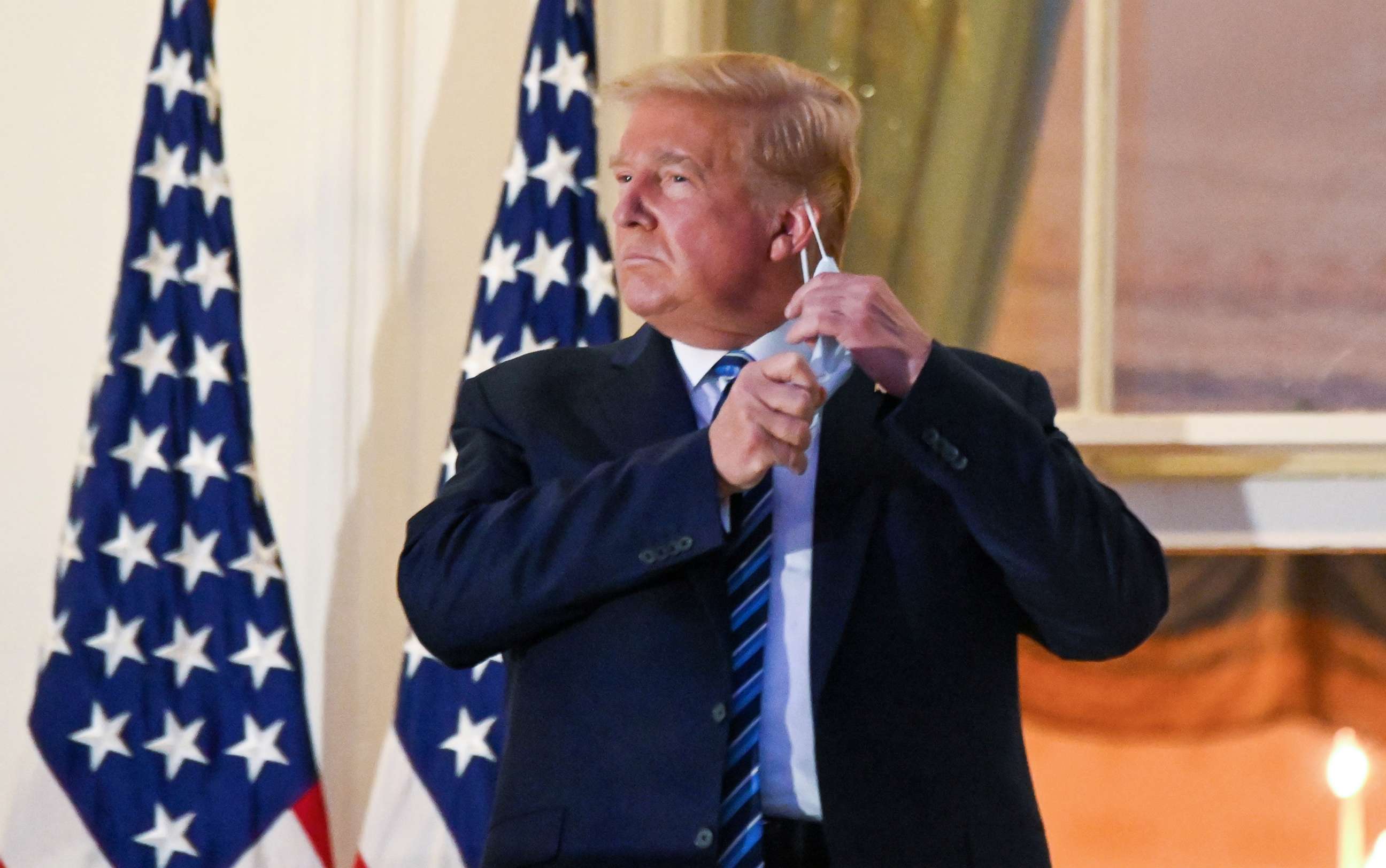'I had to do it': Trump suggests he got virus as act of political courage
"I stood out front," Trump said, appearing to defend the risks he took.
What exactly did President Donald Trump mean when he said Monday, after spending three nights in the hospital dealing with a severe case of COVID-19: "I knew there's danger to it -- but I had to do it."
In a video Trump tweeted soon after returning to the White House Monday evening, he spoke directly to the camera -- without the mask he had just dramatically taken off -- and seemed to argue his getting sick was a necessary risk to show he was a strong leader.
"As your leader, I had to do that," said Trump, flanked by American flags atop the South Portico with the Washington Monument in the distance behind him.
"I knew there's danger to it -- but I had to do it. I stood out front. I led. Nobody that's a leader would not do what I did. And I know there's a risk, there's a danger -- but that's okay," he said.

Trump's language seemed to suggest his contracting COVID-19 -- a disease that has now killed more than 210,000 Americans -- was an act of political courage to help him lead the fight against the virus, not the result of his continued refusal to always wear a mask and social distance throughout the pandemic.
Trump didn't mention any COVID-19 public health guidance in the video.
Instead, seeking to project a triumphant image, he repeatedly told American instead not to let COVID-19 "dominate" them. He sent a tweet with the same message -- "Don't be afraid of Covid -- announcing his departure from Walter Reed National Military Medical Center on Monday.
At least twice since announcing his COVID-19 diagnosis Friday morning, he has required supplemental oxygen -- at the White House Friday and at Walter Reed Saturday -- after dangerous drops in his blood oxygen level.
"I learned so much about coronavirus. And one thing that's for certain: Don't let it dominate you. Don't be afraid of it. You're gonna beat it," Trump said in the video. "We have the best medical equipment. We have the best medicines, all developed recently."
"Don't let it dominate. Don't let it take over your lives. Don't let that happen," Trump continued. "But don't let it dominate your lives. Get out there. Be careful."

Trump did not acknowledge that he has experienced unparalleled medical care few other Americans receive and that the antiviral cocktail he's being treated with has only been issued to fewer than ten people outside of a clinical trial setting.
Trump also claimed in the video, taped four days after testing positive for the virus, "Maybe I'm immune -- I don't know."
The science on whether recovering from COVID-19 confers immunity has not yet been established, according to the Centers for Disease Control and Prevention.
Trump previewed his new political strategy -- that contracting COVID-19 was the best way for him to learn about it -- in another video he tweeted from Walter Reed Sunday, just before he briefly left the hospital in the presidential motorcade to wave to supporters despite still being contagious.
"It's been a very interesting journey. I learned a lot about COVID. I learned it by really going to school. This is the real school. This isn't the, 'Let's read the book school.' And I get it. And I understand it," Trump said. "It's a very interesting thing, and I'm going to be letting you know about it."
But nearly 3 out of every 4 Americans say Trump took failed to take steps necessary to avoid contracting the virus, according to an ABC News/Ipsos poll released Sunday which was conducted on Friday and Saturday, following Trump's positive test early Friday morning.
In two separate questions, an identical 72% said that Trump did not take the "risk of contracting the virus seriously enough," nor "the appropriate precautions when it came to his personal health."



